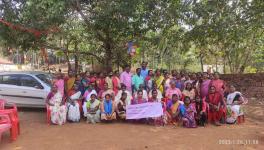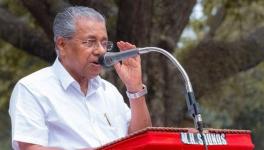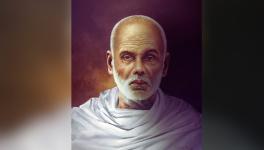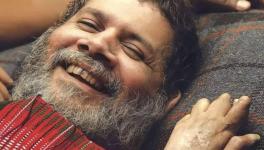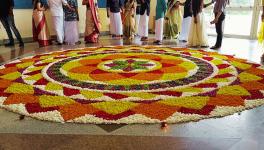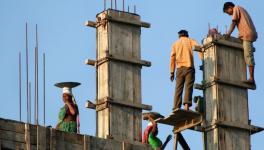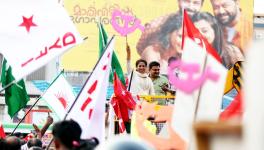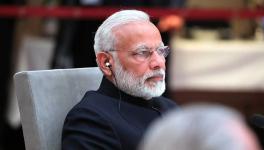Kerala’s Unique Arts Festival for School Students, the ‘Kalolsavam’ Begins in Kozhikode
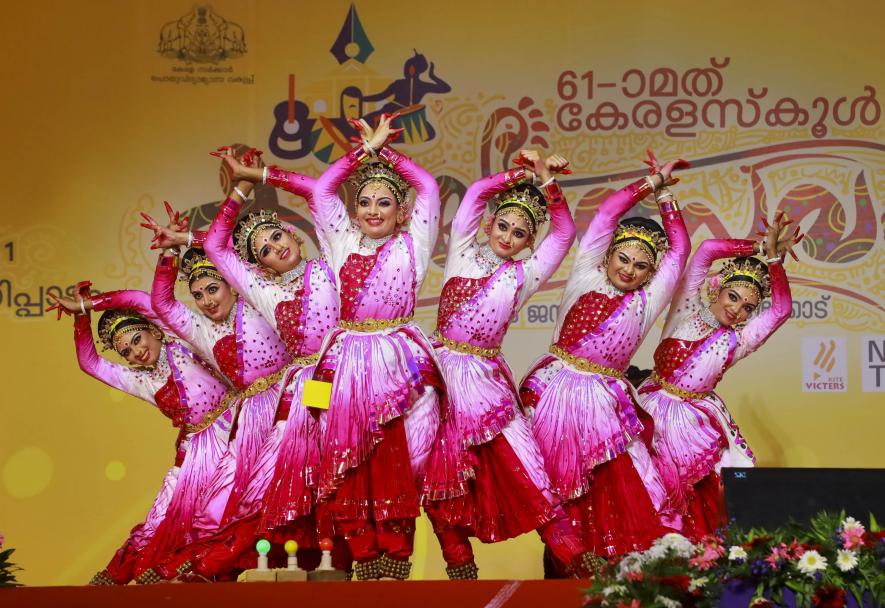
School students participate in a group dance competition during the 61st Kerala School Kalolsavam, in Kozhikode, Tuesday, Jan. 3, 2023. Image Courtesy: PTI
Kozhikode: The 61st edition of the Kerala School Kalolsavam (Arts Festival), considered the largest in Asia is off to a rollicking start in Kozhikode on January 3. The festival, considered unique for its diversity in the number and types of competition, is being held for five days, after a two-year hiatus due to the COVID-19 pandemic.
Around 14,000 students representing their schools in 14 districts will compete in 239 events held across seven stages. The competitions include cultural, literary and arts events representing diverse religious, regional and linguistic backgrounds.
The competitions will be held under four broad categories, namely High School (HS)-General, Higher Secondary School (HSS)-General, HS-Sanskrit and HS-Arabic at the state level, while the lower and upper primary events are held at district levels alone.
PART OF HISTORY AND CULTURE
The Kalolsavam called the Kerala Youth Festival or Yuvajanolsavam until 2008 is a part of the culture of the state. The competitions were first held in 1956-57 soon after the linguistic states were formed and have become a part of the public culture.
The competitions had a humble start, held in a few classrooms as a one-day event in 1957 has now grown to a week-long extravaganza hosting more than 200 events. The winning district will take home the 117.5 sovereign rolling golden trophy.
Inaugurating the event, the chief minister Pinarayi Vijayan said, “Art is beyond any religion or caste. The festival should be enjoyed and seen by everyone in order to ensure unity in the state. We can ensure that Kerala continues to be a centre of peace, happiness and secularism”.
He added that “the festival is turning into a cultural gathering, being used by the new generation for social criticism and innovation using various art forms”.
The festival has been utilised as the hunting ground by the Malayalam film industry as the festival has gifted several artists to the industry in the past. The event was presided by general education minister V SIvankutty, while speaker A N Samsheer, Mayor of Kozhikode Beena Phillip, Ministers, and MLAs were present.
The HS-general section has 96 competitions and HSS-general is fought under 105 competitions. The HS-Arabic and Sanskrit section has 19 competitions each.
DIVERSE NATURE OF EVENTS
A vital factor of the festival is the array of events included, cutting across religion, region and language. The traditional art forms including Kathakali, Bharatnatyam, Thiruvathiraali, Mohiniyatam, Kuchipudi, Poorakali, and Chavittunatakam are key attractions in the festival.
Art forms like Yakshaganam found in Dakshina Kannada and Tulu Nadu, the Tulu-speaking areas of Kasargod district in Kerala also find a place in the festival. Oration competitions include Urdu, Tamil, and Kannada besides Malayalam, English and Hindi.
Duffmuttu, an art form practised by Muslims in the Malabar region and Margamkali, a form of the Syro Malabar Christians also find a place in the 239 different competitions.
The singing competitions include Gazal (Urdu) while Poetry and Story Writing competitions include Arabic, Sanskrit, Urdu and Hindi.
The diversity does not end here. Other competitions include light music, flute, nagaswaram, mimicry, Carnatic music, violin, panchavadyam- an orchestra of five instruments including percussion and wind, nadodi nritham- a tribal folk dance form in Kerala, nangiar koothu- a Sanskrit drama tradition and Quiz.
The festival flag was hoisted by the director of general education, on a guitar-shaped flagpole. The organising committee has rolled out route maps for the venues, live updates of the results along with the status of the stages. The competitions are telecast live on the KITE-Victers, the channel of the school education department.
The organisation of events have won laurels for the hassle-free conduct of competitions across different locations. The medical aid facilities, with around 150 youth and junior red cross volunteers in 17 medical centres and the Green Brigade, entrusted with the duty of keeping the event plastic-free are effective contributors to the festival.
DOMINANCE OF MALABAR DISTRICTS
The Malabar districts have dominated the festival since the first competition was held in 1957. For the record, the Kozhikode district has won the event 21 times followed by Thiruvananthapuram 17 times (not once since 1989).
The districts of Kozhikode, Thrissur (5), Palakkad(3) and Kannur (4) have won 33 of the 60 festivals held so far. Since 2004, the districts of Kozhikode (13 times) and Palakkad (3) have won the event while both districts were joint winners in 2015.
Get the latest reports & analysis with people's perspective on Protests, movements & deep analytical videos, discussions of the current affairs in your Telegram app. Subscribe to NewsClick's Telegram channel & get Real-Time updates on stories, as they get published on our website.









